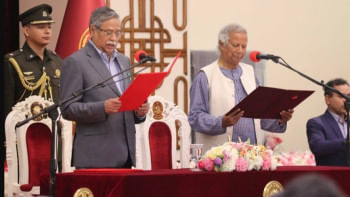July Declaration replaces a politicised history with an even more politicised version: David Bergman

David Bergman, a British investigative journalist who writes on politics and human rights in Bangladesh, has criticised the July Declaration for its "partisan bias" and presenting a "politicised version" of Bangladesh's history.
In a Facebook post published yesterday, Bergman provided a detailed analysis of the declaration -- beginning with how it takes a "biased and partial" view of history and "description of Awami League".
"That is to say, much of it reads like a political tract written by long standing adversaries and critics of the Awami League," he writes.
But Bergman says that the "politicised narrative" of the declaration was "arguably far more problematic than the politicised history that the Awami League deployed in relation to the 1971 war." He says this document was only replacing one politicised version of history by another even more politicised version. "Who knew that was what August 5 was about!"
Then he proceeds to list out the omissions of the July Declaration and points out how it makes sweeping statements or glosses over certain phases of Bangladesh's history. He says, "Awami League's rule between 1972 to 1975 is simply represented by one-party-state BAKSAL, omitting all the post-war nation building that the Awami League government also earlier undertook."
Bergman takes note that the declaration "bizarrely seeks to lay the blame for the Awami League's 'failure to materialise the people's aspirations' post-1971, on the 'weaknesses in the procedures of drafting and in the structure of the constitution'."
He writes, "There are no doubt many reasons why the Awami League was not as successful as it should have been between 1972 to 1975, but I have never heard that the 'drafting' and 'structure' of the constitution is one of them. (I guess this 'constitutional' argument emerges from a niche political grouping now powerful in Bangladesh who want to find reasons to justify a new constitution.)"
He writes that the declaration does not mention the assassination of Sheikh Mujib and 16 members of his family in August 1975 which brought in years of military rule, or the post-Mujib period between November 1975 to 1982, when Ziaur Rahman (who became the leader of the Bangladesh Nationalist Party) was in power. This period Bergman says "is glossed over" and represented as simply "an uprising in the army ranks joined by common people" which laid the way "for reintroducing multi-party democracy." "This is a highly pro-BNP version of that period," he adds.
Bergman also notes how the military controlled government replacing the caretaker government in January 2007 is referred to as a "conspiratorial arrangement."
"So, these are the adjectives used by the declaration to describe the Awami League's period of government: 'anti-people', 'autocratic', 'against human rights', 'mafia and failed state', 'rampant corruption', 'looting of banks' and 'pursued polices adversely affecting the environment, ecology and climate.' Some of these descriptions are of course true. But there is another side of the Awami League completely omitted in the declaration," he writes.
Bergman then points out that the Awami League also had remarkable achievements in economic growth, education of girls, infrastructural development, and climate change.
He writes, "The declaration refers to an opinion given by the Supreme Court on 8 August 2024, under Article 106 of the constitution, which it claims legitimised the interim government. However, nobody, as far as I am aware has seen the signed order, raising questions about whether it was ever signed by the judges."
The British journalist agrees that July protesters should be given some kind of legal protection to stop them from being prosecuted in future. "The wording used seems also to seek to give immunity to those involved in the killing of Awami Leaguers and police officers during the protests (in whatever circumstances those killings took place)," he says, adding this is "problematic in terms of rule of law."
To the proposition that the document will feature in the schedule of the constitution, he comments, "Surely, it would be a disgrace if such a historically partial and politicised document could ever be included in the constitution."
Bergman notes, among the positive aspects, that the declaration places 1971 in its rightful position in the nation's history and says that the fight was for a "liberal democratic" state; describes the protests and uprising accurately; sets out the aspirations of the people of Bangladesh well; accurately states that the numbers killed in July/August 2024 were nearly one thousand.
David Bergman concludes saying that the declaration should have been much shorter and concise. "It should not have included, other than paras 1 and 2 on the 1971 war, any political history; skipped to a revised version of para 13 concerning the increasingly authoritarianism of the Awami League; and then included revised versions of paras 15 to para 27."
The British journalist reposted his initial comments today, saying that he might have been too direct in his criticism of Dr Yunus and wrote, "…whilst I may also be critical of Yunus and the government concerning some other decisions and policies (in particular how it has dealt with arbitrary detentions etc.) I am at the same time supportive of other aspects of what Yunus and the government has done and achieved, many of which were set out in the speech he gave after the July Declaration."

 For all latest news, follow The Daily Star's Google News channel.
For all latest news, follow The Daily Star's Google News channel. 



Comments